Nurses Narratives Sister Ella Jane Tucker Part 1
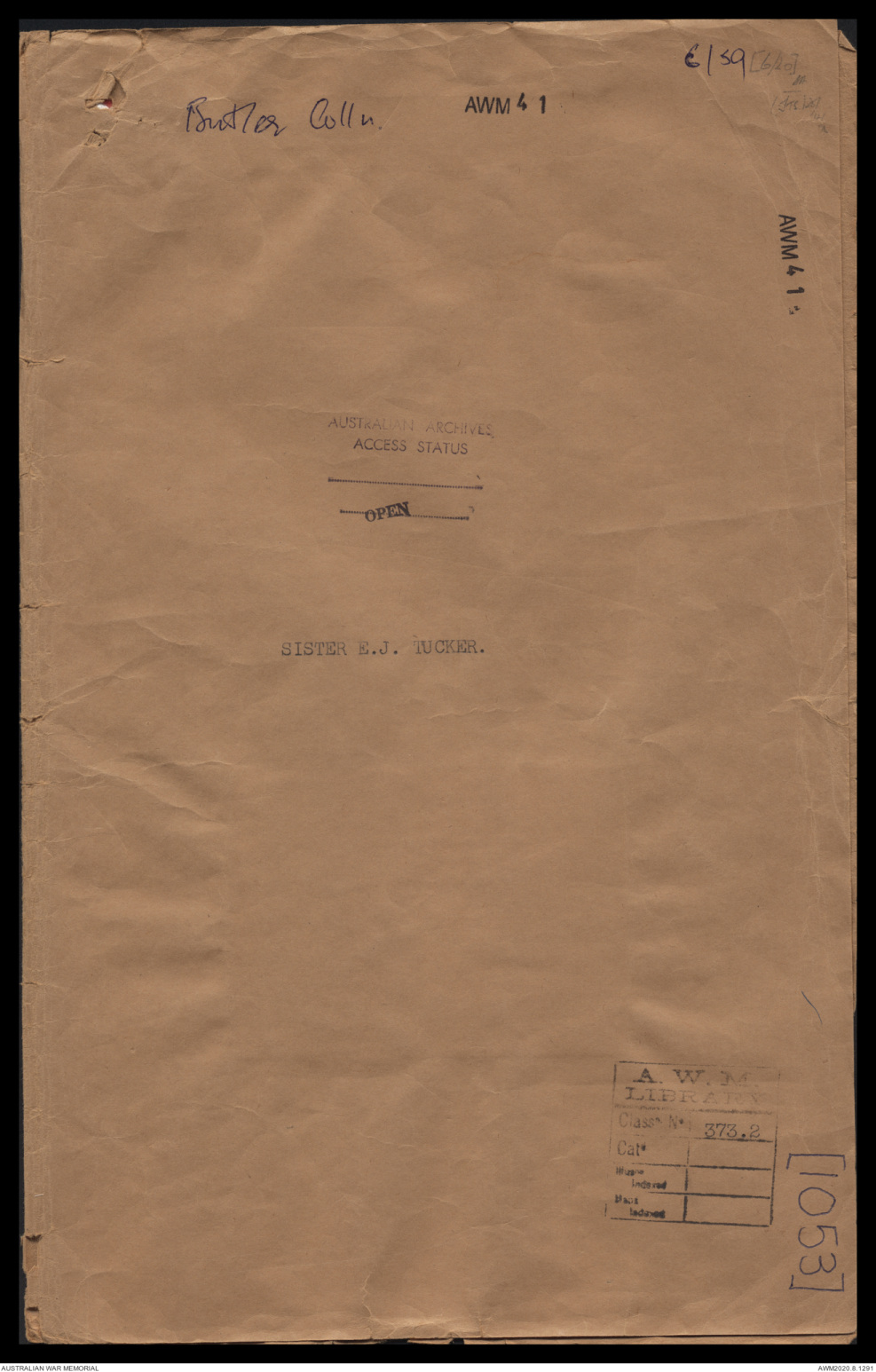
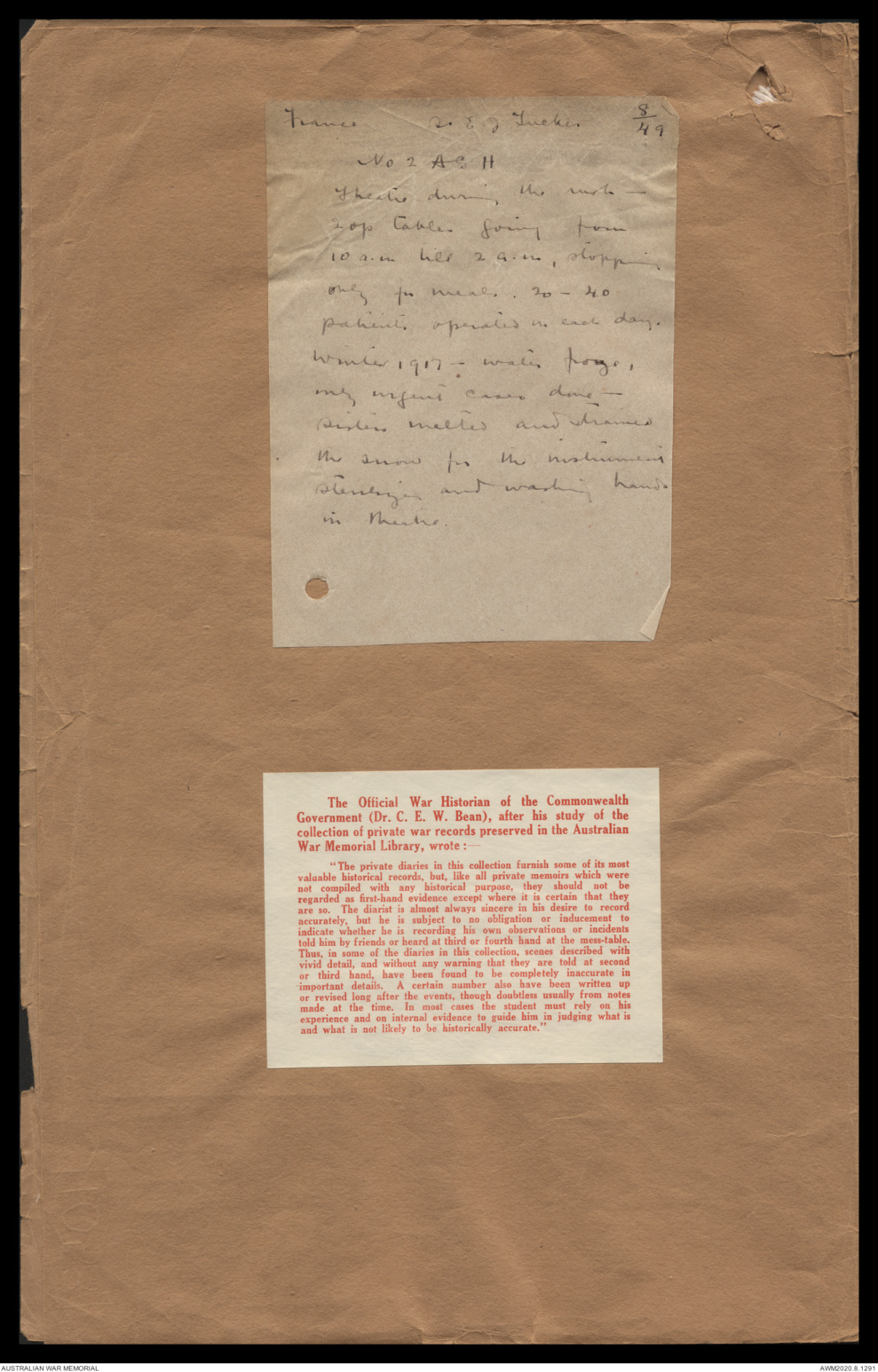
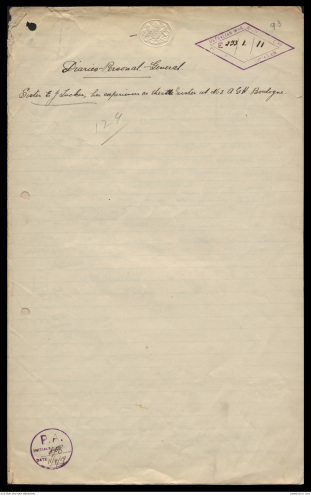
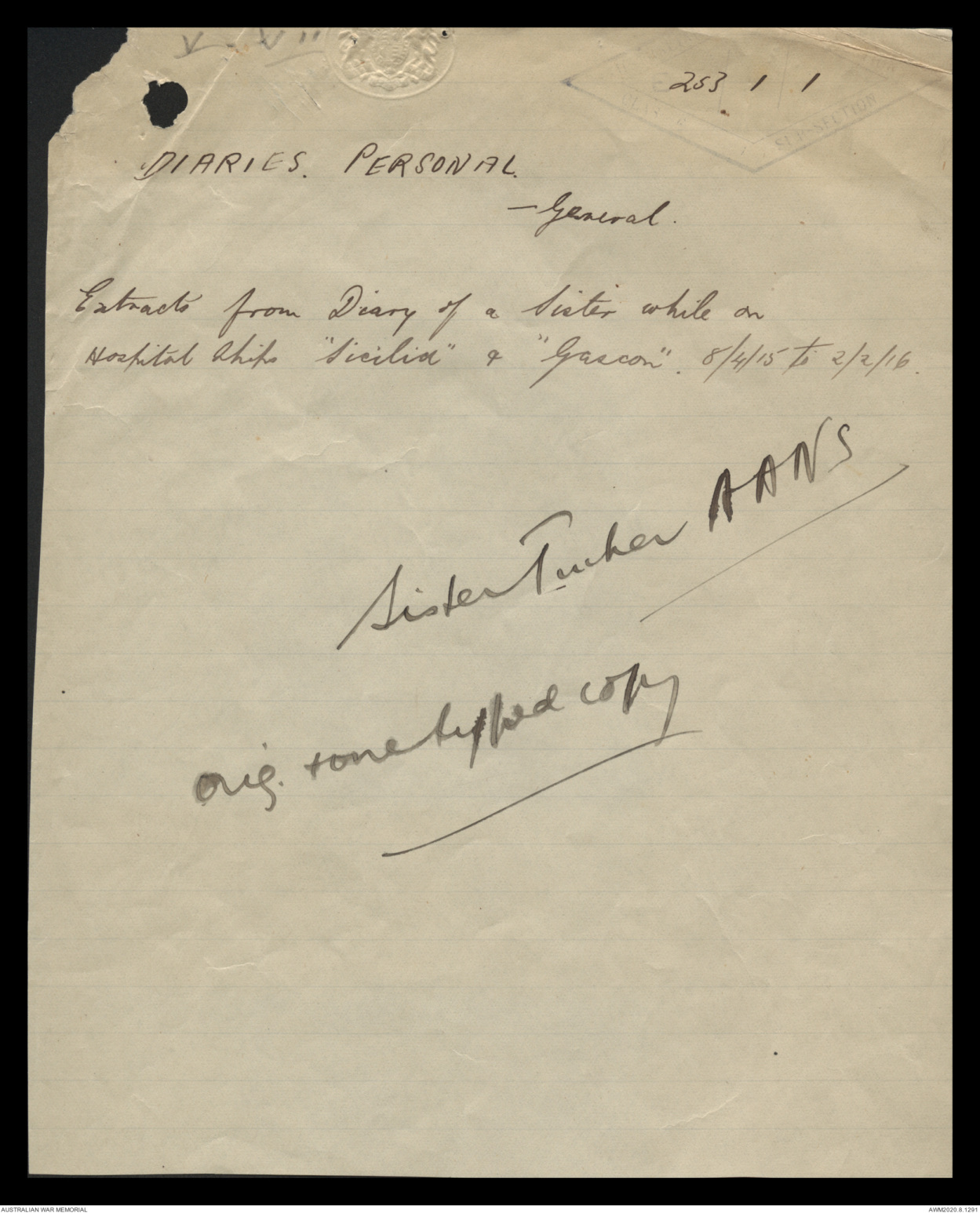
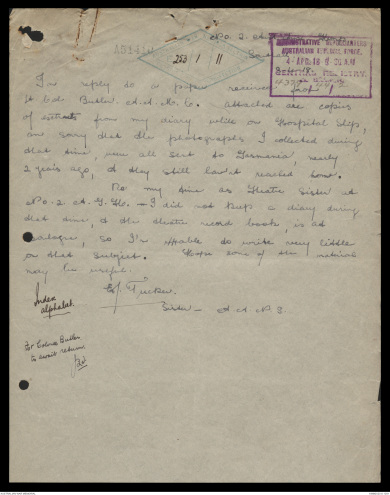
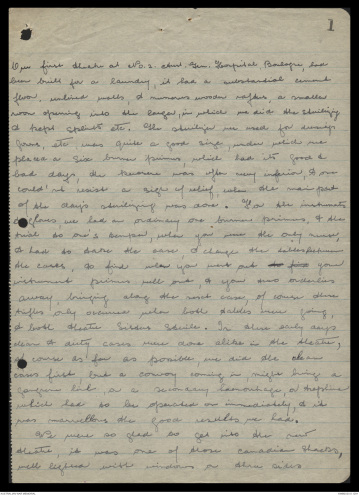
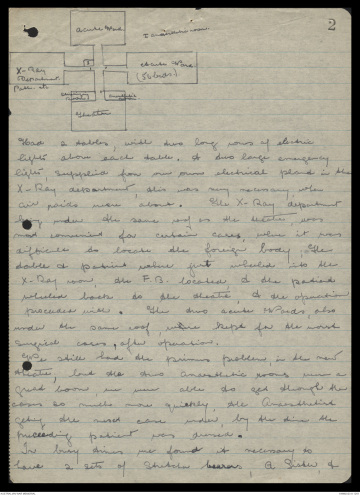
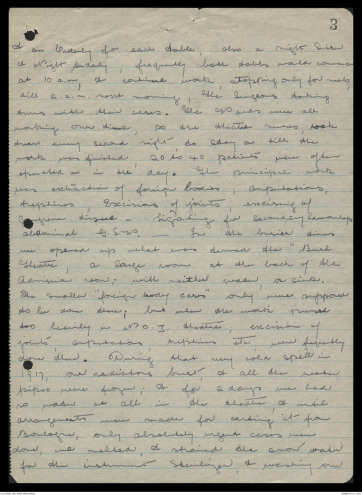
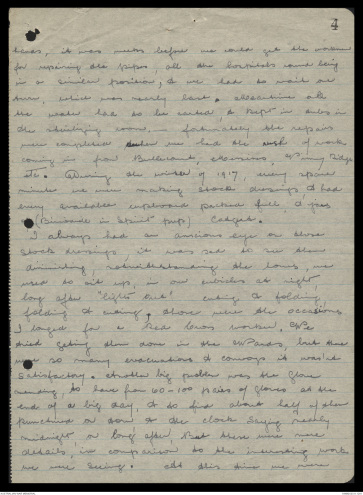
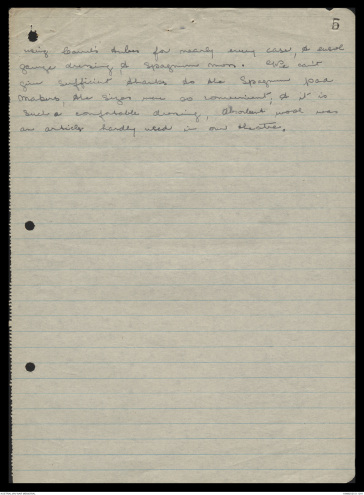
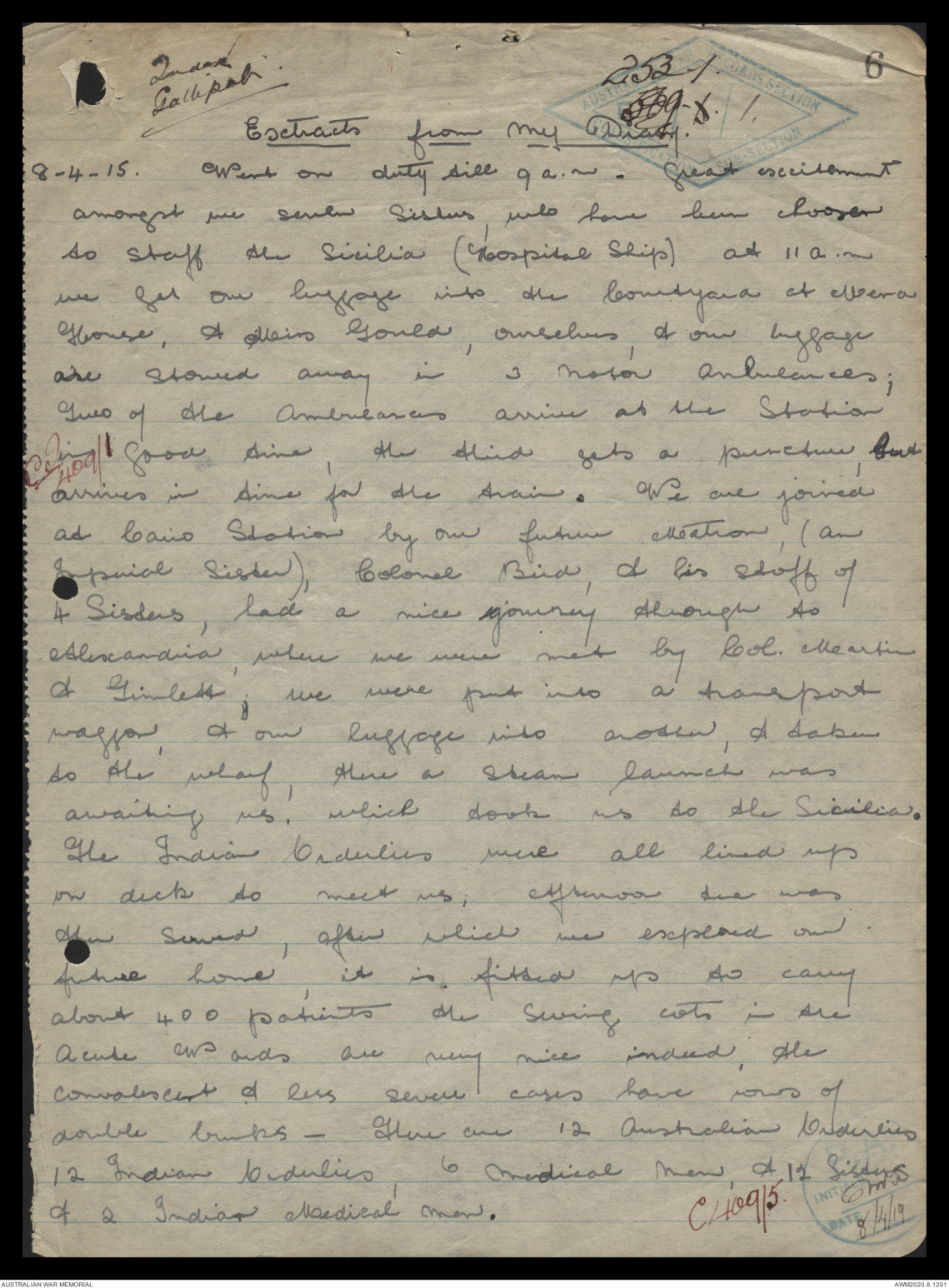
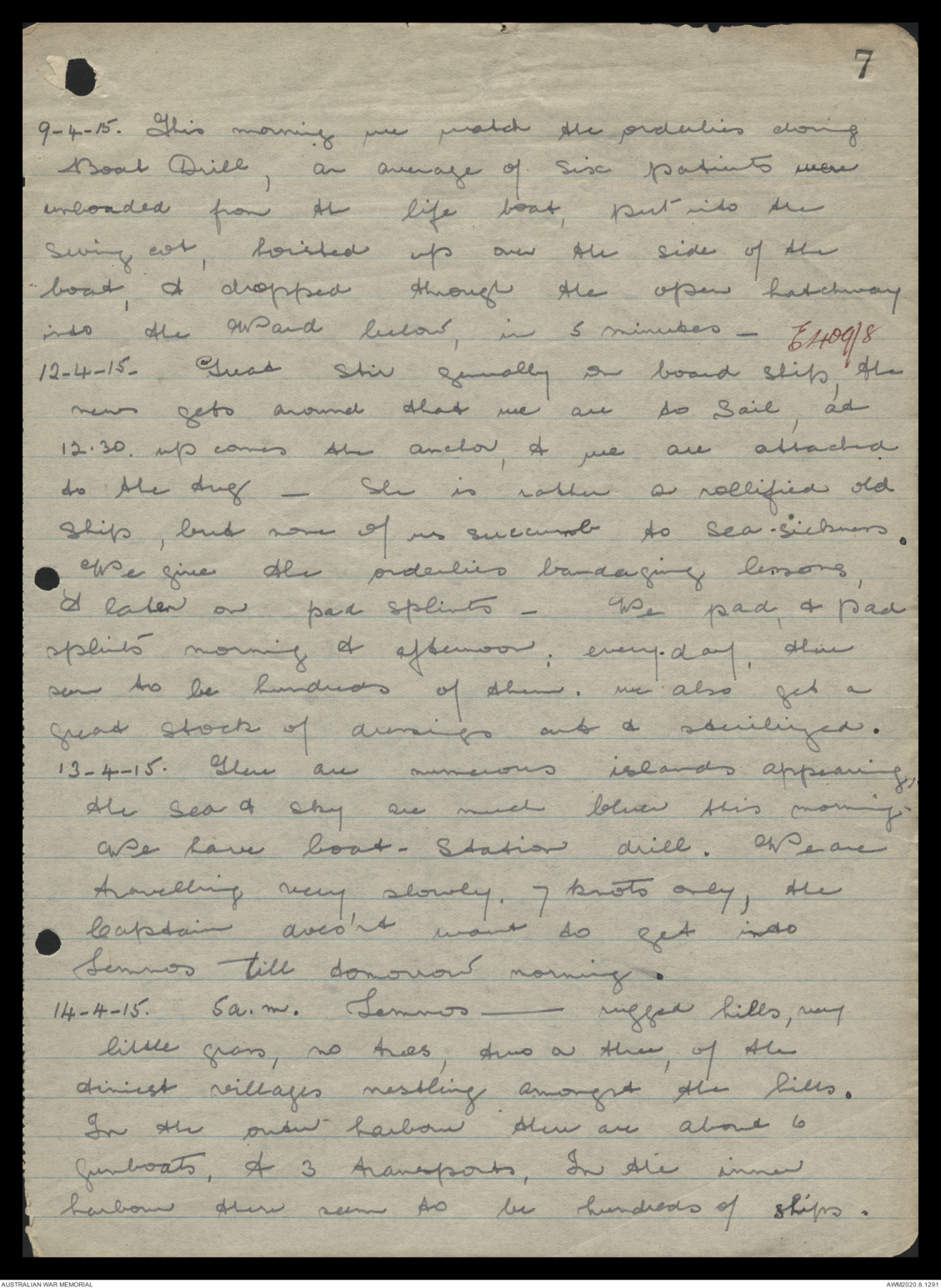
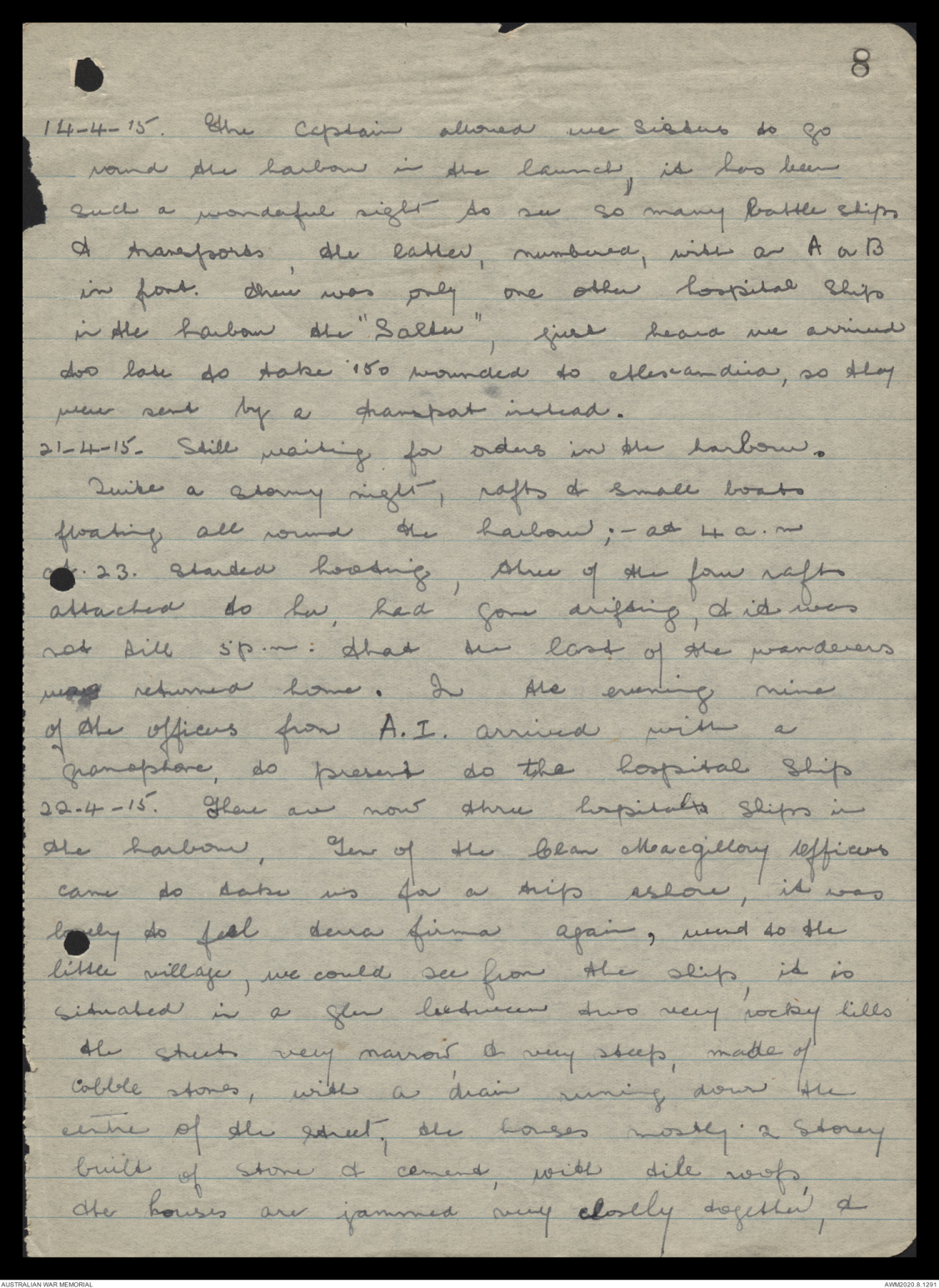
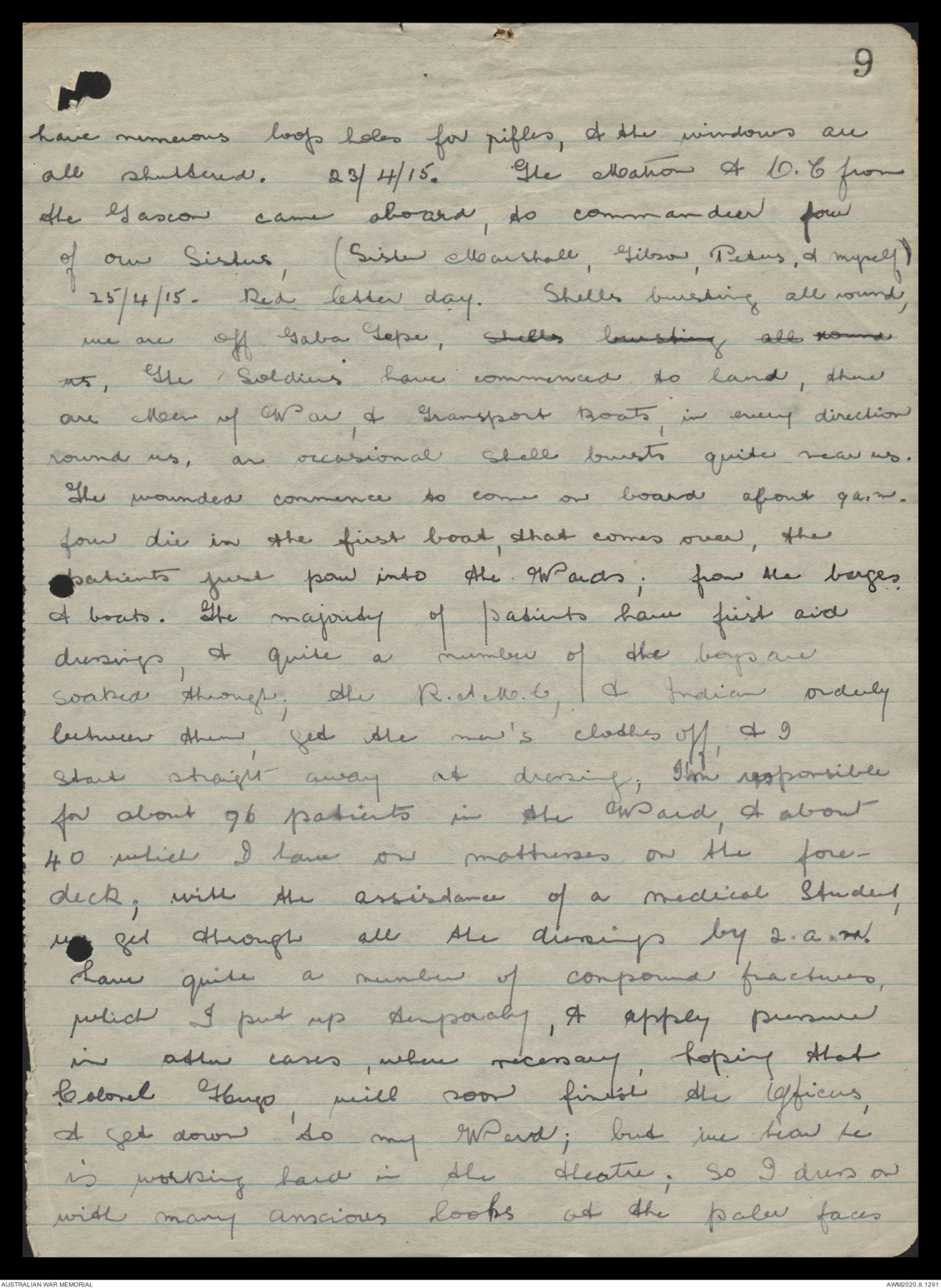
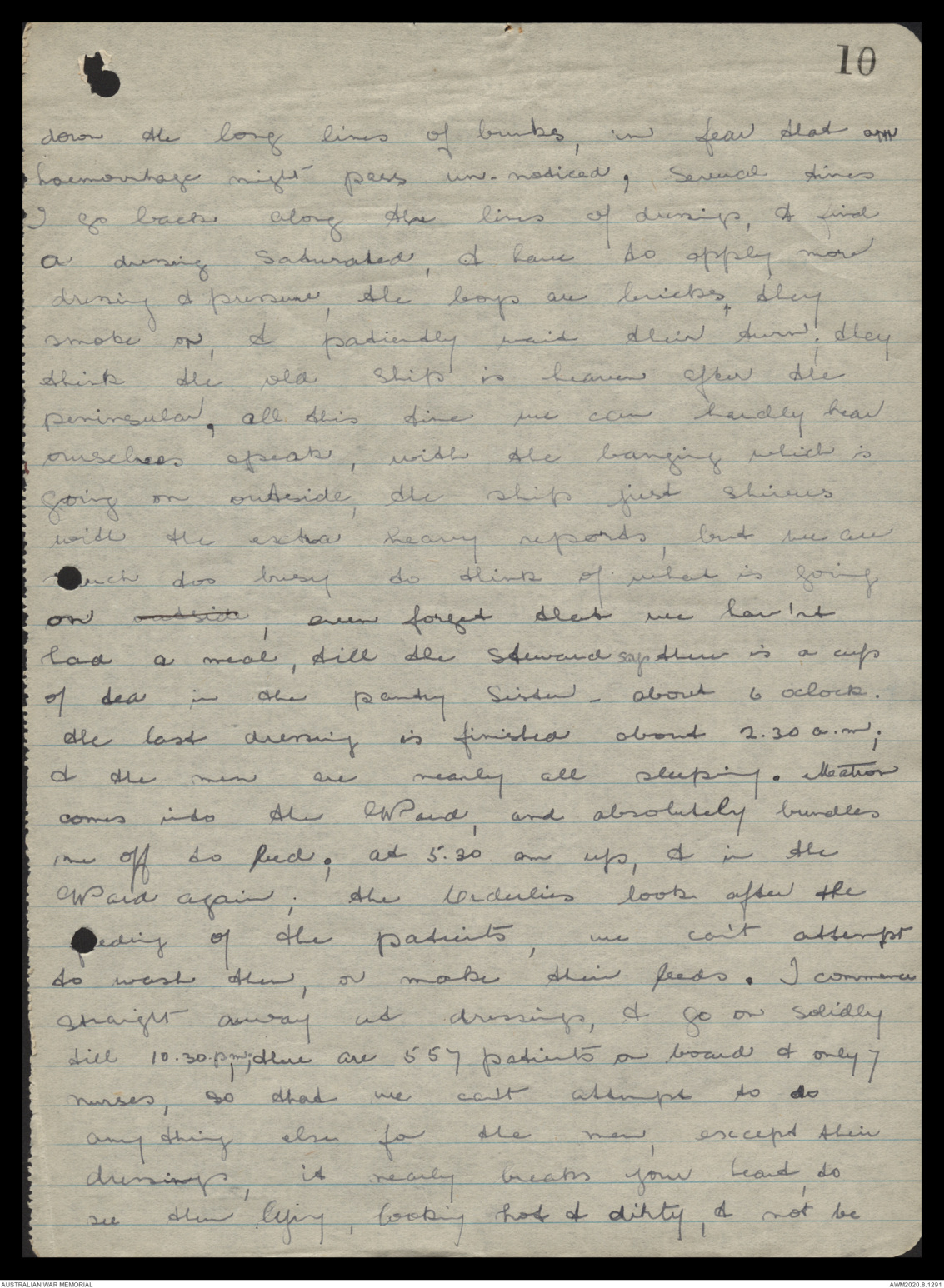
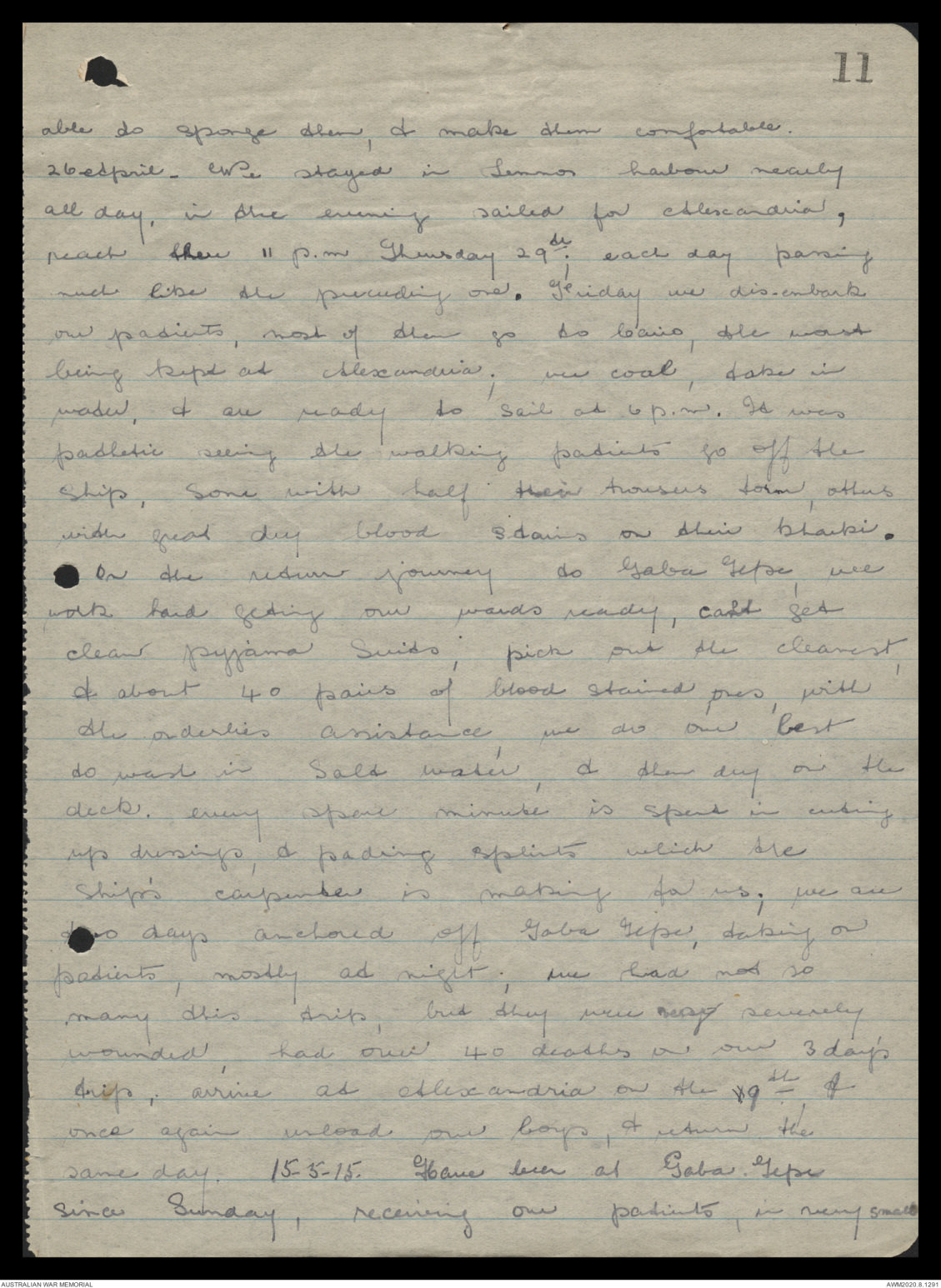
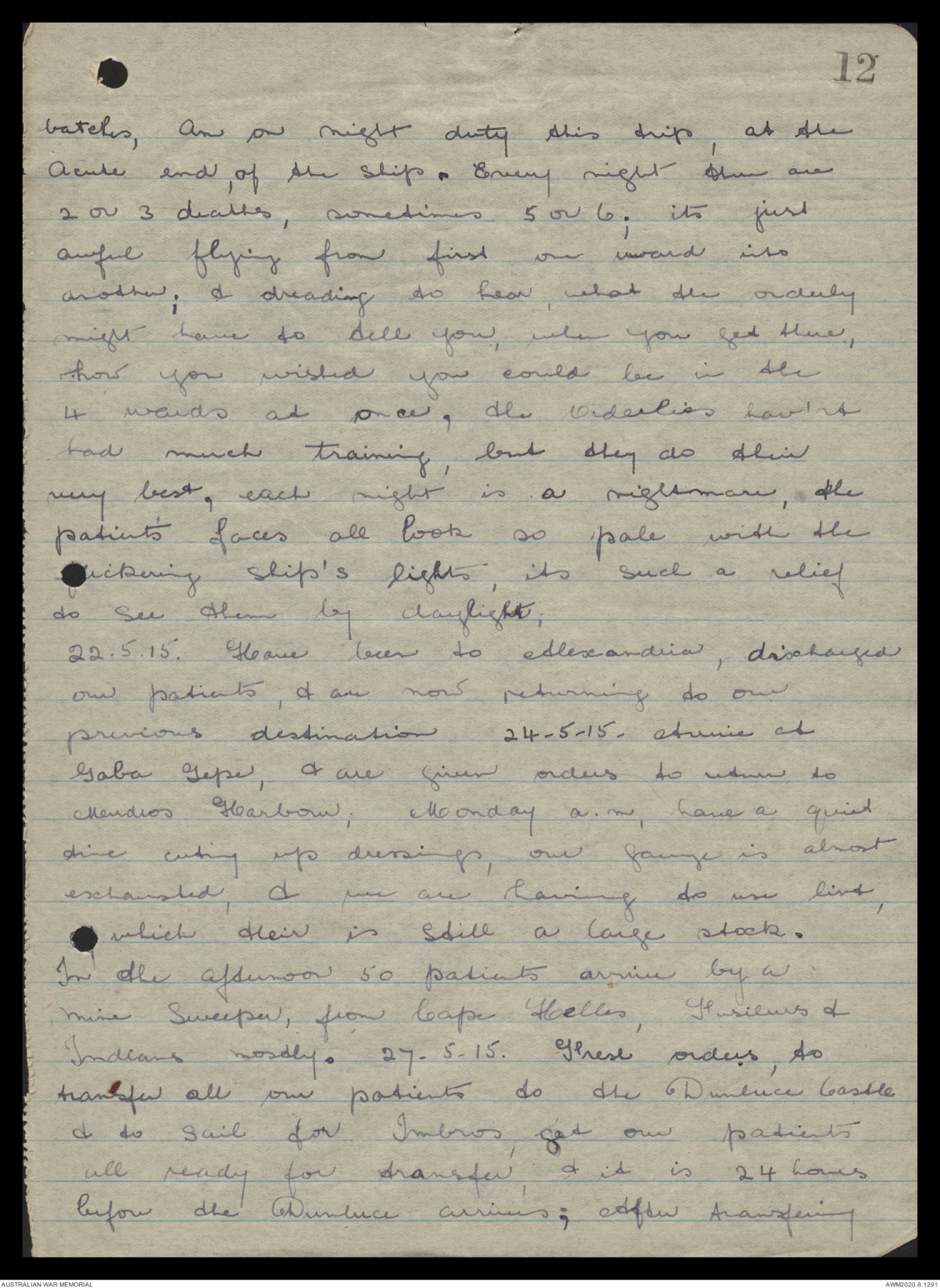
Butler Colln. AWM 41 6|59[6/20]
AUSTRALIAN ARCHIVES
ACCESS STATUS
OPEN
SISTER E.J. TUCKER.
A.W.M.
LIBRARY
Class No 373.2
Cat
[*1053*]
France Sr E.J. Tucker 8/49
No 2 AGH
Theatre during the rush -
2 op tables going from
10 a.m till 2 a.m, stopping
only for meals. 20 - 40
patients operated on each day.
Winter 1917 - water froze,
only urgent cases done -
sisters melted and strained
the snow for the instrument
sterilizer and washing hands
in theatre.
The Official War Historian of the Commonwealth
Government (Dr. C. E. W. Bean), after his study of the
collection of private war records preserved in the Australian
War Memorial Library, wrote:-
"The private diaries in this collection furnish some of its most
valuable historical records, but, like all private memoirs which were
not compiled with any historical purpose, they should not be
regarded as first-hand evidence except where it is certain that they
are so. The diarist is almost always sincere in his desire to record
accurately, but he is subject to no obligation or inducement to
indicate whether he is recording his own observations or incidents
told him by friends or heard at third or fourth hand at the mess-table.
Thus, in some of the diaries in this collection, scenes described with
vivid detail, and without any warning that they are told at second
or third hand, have been found to be completely inaccurate in
important details. A certain number also have been written up
or revised long after the events, though doubtless usually from notes
made at the time. In most cases the student must rely on his
experience and on internal evidence to guide him in judging what is
and what is not likely to be historically accurate".
93
E 253/1/11
Diaries-Personal-General
Sister & J Tucker, her experiences as theatre sister at No2 A G H Boulogne
129.
P.A
INITIALS [[?]]
DATE 11/4/19
253 1 1
DIARIES. PERSONAL
- General
Extracts from Diary of a Sister while on
Hospital Ships "Sicilia" & "Gascon". 8/4/15 to 2/2/16.
Sister Tucker AANS
orig. & one typed copy
A51410 [[ePo. 2.?]] [[???]]
E253/1/11
Southall
3-4-18.
4379 44 2
In reply to a paper received from
Lt. Col [Butler.A.A.M.C.?]attached are copies
of extracts from my diary while on Hospital Ship,
am sorry that the photographs I collected during
that time, were all sent to Tasmania, nearly
2 years ago, & they still hav'nt reached home.
Re my time as Theatre Sister at
No . 2 . A . G . H. I did not keep a diary during
that time, & the theatre record book, is at
Boulogne, so I'm unable to write very little
on that subject. Hope some of the material
may be useful.
Index alphabet.
EJ. Tucker.
Sister A.A.N.S.
For Colonel Butler.
to await return.
1
Our first theatre at No. 2. Aust. Gen. Hospital Boulogne, had
been built for a laundry, it had a substantial cement
floor, unlined walls, & numerous wooden rafters, a smaller
room opening into the larger, in which we did the sterilizing
& kept splints etc. The sterilizer we used for dressings,
gowns, etc, was quite a good size, under which we
placed a six burner primers, which had its good &
bad days, the kerosene was often very inferior, & one
could 'nt resist a sigh of relief, when the main part
of the day's sterilizing was done. For the instruments
& gloves, we had a ordinary one burner primus, & the
trial to one's temper, when you were the only nurse,
& had to take the case, & change the tables between
the cases, to find when you went out to find your
instrument primus well out, & your two orderlies
away, bringing along the next case, of course these
trifles only occurred when both tables were going,
& both theatre Sisters sterile. In these early days
clean & dirty cases were done alike in the theatre,
of course as far as possible, we did the clean
cases first, but a convoy coming in, might bring a
gangrene limb, or a secondary hemorhage, or trephines
which had to be operated on immediately, & it
was marvellous the good results we had.
We were so glad to get into the new
theatre, it was one of those Canadian shacks,
well lighted with windows on three sides
acute Ward anaesthetic room.
X - Ray Acute Ward.
Department (56 beds.)
Path. etc
Sterilizing anesthetic
Room room.
Theatre
Had 2 tables, with two long rows of electric
lights above each table. & two large emergency
lights, suppliid from our our electrical plant in the
X - Ray department, this was very necesary, when
air raids were about. The X- Ray department
being under the same roof as the theatre, was
most convenient for certain cases, where it was
difficult to locate the foreign body; the
table & patient where just wheeled into the
X- Ray room, the F.B. located & the patient
wheeled back to the theatre, & the operation
proceeded with. The two acute Wards, also
under the same roof, where kept for the worst
surgical cases, after operation.
We still had the primus problem, in the new
theatre, but the two anaesthetic rooms were a
great boon, we were able to get through the
cases so much more quickly, the Anaesthetist
getting the next case under, by the time the
proceeding patient was dressed.
In busy times we found it necessary to
have 2 sets of stretcher bearers, a Sister, &
3
& an Orderly for each table, also a night Sister
& Night Orderly, frequently both tables would commence
at 10 a.m, & continue work, stopping only for meals,
till 2.a.m. next morning ; other Surgeons taking
turns with their cases. The Wards were all
working over time, so the theatre nurses, took
turns every second night, to stay on till the
work was finished, 20 to 40 patients were often
operated on in the day. The principal work
was extraction of foreign bodies; amputations,
trephines, excisions of joints, excising of
gangrene tissue ligating for secondary haemorrhages
abdominal G.S.W. In the busier times
we opened up what was termed the "Bush
Theatre, a large room at the back of the
Admission room; with neither water, or sink.
The smaller "foreign body cases" only were supposed
to be done there; but when the work pressed
too heavily in No.1 theatre; excision of
joints, amputations, trephines etc, were frequently
done there. During that very cold spell in
1917, our radiators bust, & all the heater
pipes were frozen; & for 2 days we had
no water at all in the theatre, & until
arrangements were made for carting it from
Boulogne, only absolutely urgent cases were
done, we melted, & strained the snow water
for the instrument sterilizer, & washing our
4
hands, it was weeks before we could get the workmen
for repairing the pipes, all the hospitals round being
in a similar position, & we had to wait our
turn, which was nearly last. Meantime all
the water had to be carted, & kept in tubs in
the sterilizing room, fortunately the repairs
were completed when we had the rush of work
coming in from Bullecourt, Messines, Vimy Ridge
etc. During the winter of 1917, every spare
minute we were making stock dressings, & had
every available cupboard packed full, & jars
of (Biniodide in spirit prep) catgut.
I always had an anxious eye on those
stock dressings, it was sad to see them
diminishing, notwithstanding the hours, we
used to sit up, in our cubicles at night,
long after "lights out" cutting & folding,
folding & cutting, those were the occasions
I longed for a Red Cross worker. We
tried getting them done in the Wards, but there
were so many evacuations & convoys it was'nt
satisfactory. Another big problem was the glove
mending, to have from 60 - 100 pairs of gloves at the
end of a big day, & to find about half of them
punctured or torn & the clock saying nearly
midnight, or long after. But these were mere
details, in comparison to the interesting work
we were seeing. At this time we were
5
using Carrie's tubes for nearly every case, & eusol
gauze dressing, & Spagnum moss. We can't
give sufficient thanks to the Spagnum pad
makers, the sizes were so convenient; & it is
such a comfortable dressing, absorbent wool was
an article hardly used in our theatre.
6
London
Gallipoli 253-1569-1
Extracts from my Diary
8-4-15. Went on duty till 9 am. Great excitement
amongst we seven Sisters, who have been choosen
to staff the Sicilia (Hospital Ship) at 11 a.m
we get our luggage into the Courtyard at Vera
House, & Meirs, Gould, ourselves, & our luggage
are stowed away in 3 motor Ambulances;
Two of the Ambulances arrive at the Station
in good time, the third gets a puncture, but [*CJ 409/8 1*]
arrives in time for the train. We are joined
at Cairo Station by our future Matron, (an
Imperial Sister), Colonel Bird, & his staff of
4 Sisters, had a nice journey through to
Alexandria, where we were met by Col. Martin
& Gimlett ; we were put into a transport
waggon, & our luggage into another, & taken
to the wharf, there a steam launch was
awaiting us, which took us to the Sicilia.
The Indian Orderlies were all lined up
on deck to meet us; afternoon tea was
then served, after which we explored our
future home, it is fitted up to carry
about 400 patients the swing cots in the
Acute Wards are very nice indeed, the
convalescent & less severe cases have rows of
double bunks - There are 12 Australian Orderlies,
12 Indian Orderlies, 6 Medical Men, & 12 Sisters
& 2 Indian Medical Men.
[*C4069/5.*] [*P.A initials CM? Date 8/4/19*]
7
9-4-15. This morning we watch the orderlies doing
Boat Drill, an average of six patients were
unloaded from the life boat, put into the
swing cot, hoisted up over the side of the
boat, & dropped through the open hatchway
into the Ward below, in 5 minutes - [* E409/8*]
12-4-15. Great stir generally on board ship, the
news gets around that we are to sail, at
12.30. up comes the anchor, and we are attached
to the tug - She is rather a rollified old
ship, but none of us succumb to sea-sickness.
We give the orderlies bandaging lessons,
& later on pad splints - We pad, & pad
splints morning and afternoon, every day, there
seem to be hundreds of them. we also get a
great stock of dressings out & sterilized.
13-4-15. There are numerous islands appearing,
the sea and sky are much bluer this morning.
We have boat-station drill. We are
travelling very slowly, 7 knots only, the
Captain doesn't want to get into
Lemnos till tomorrow morning.
14-4-15. 5a.m. Lemnos - rugged hills, very
little grass, no trees, two or three, of the
tiniest villages nestling amongst the hills.
In the outer harbour there are about 6
Gunboats, & 3 transports, In the inner
harbour there seem to be hundreds of ships.
8
14-4-15. The captain allowed we sisters to go
round the harbour in the launch, it has been
such a wonderful sight to see so many battle ships
and transports, the latter, numbered, with an A or B
in front. There was only one other hospital ship
in the harbour the "Salem", first heard we arrived
too late to take 150 wounded to Alexandria, so they
were sent by a transport instead.
21-4-15. Still waiting for orders in the harbour.
Quite a stormy night, rafts and small boats
floating all round the harbour; - at 4 a.m
A23. started hooting, three of the four rafts
attached to her, had gone drifting, and it was
not till 5 p.m. that the last of the wanderers
were returned home. In the evening nine
of the officers from A.1. arrived with a
gramophone, to present to the hospital ship
22-4-15. There are now three hospital ships in
the harbour. Ten of the Clan Macgillory Officers
came to take us for a trip ashore, it was
lovely to feel terra firma again, went to the
little village, we could see from the ship, it is
situated in a glen between two very rocky hills
the streets very narrow, and very steep, made of
cobble stones, with a drain running down the
centre of the street, the houses mostly 2 storey
built of stone & cement, with tile roofs,
the houses are jammed very closely together, &
9
have numerous loop holes for rifles, & the windows are
all shuttered. 23/4/15. The Matron & O.C from
the Gascon came aboard, to commandeer four
of our Sisters, (Sister Marshall, Gibson, Peters, and myself)
25/4/15. Red letter day. Shells bursting all round,
we are off Gaba Tepe, shells bursting all round us, The Soldiers have commenced to land, there
are Men of War, & Transport Boats , in every direction
round us, an occasional shell bursts quite near us.
The wounded commence to come on board about 9a.m.
four die in the first boat, that comes over, the
patients just pour into the Wards; from the barges
& boats. The majority of patients have first aid
dressings, & quite a number of the boys are
soaked through; the R.A.M.C, & Indian orderly
between them, get the men's clothes off, & I
start straight away at dressing, I'm responsible
for about 76 patients in the Ward, & about
40 which I have on mattresses on the foredeck;
with the assistance of a medical student,
we get through all the dressings by 2. a.m.
have quite a number of compound fractures,
which I put up temporaly, & apply pressure
in other cases, where necessary, hoping that
Colonel Hays, will soon finish the Officers,
& get down to my Ward; but we hear he
is working hard in the theatre; so I press on
with many anxious looks at the pale faces
10
down the long line of bunks, in fear that an
haemorrhage might pass un-noticed, Several times
I go back along the lines of dressings, & find
a dressing saturated, & have to apply more
dressing and pressure, the boys are bricks, they
smoke on, & patiently wait their turn; they
think the old ship is heaven after the
peninsular, all this time we can hardly hear
ourselves speak, with the banging which is
going on outside, the ship just shivers
with the extra heavy reports, but we are
much too busy to think of what is going
on outside, even forget that we have'nt
had a meal, till the Steward says there is a cup
of tea in the pantry Sister - about 6 oclock.
the last dressing is finished about 2.30 a.m;
& the men are nearly all sleeping. Matron
comes into the Ward, and absolutely bundles
me off to bed; at 5.30 am up, & in the
Ward again; the orderlies look after the
feeding of the patients, we can't attempt
to wash them, or make their beds. I commence
straight away at dressings, & go on solidly
till 10.30. pm; there are 557 patients on board & only 7
nurses, so that we can't attempt to do
anything else for the men, except their
dressings, it really breaks your heart, to
see them lying, looking hot and dirty, & not be
11
able to sponge them, & make them comfortable.
26 April. We stayed in Lemnos harbour nearly
all day, in the evening sailed for Alexandria,
reach there 11 p.m Thursday 29th; each day passing
much like the preceeding one. Friday we dis-embark
our patients, most of them go to Cairo, the worst
being kept at Alexandria; new coal, take in
water, & are ready to sail at 6p.m. It was
pathetic seeing the walking patients go off the
ship, some with half their trousers torn, others
with great dry blood stains on their kharki.
On the return journey to Gaba Tepe, we
work hard getting our wards ready, cant get
clean pyjama suits, pick out the cleanest,
& about 40 pairs of blood stained ones, with
the orderlies assistance, we do our best
to wash in salt water, and then dry on the
deck. every spare minute is spent in cutting
up dressings, & padding splints which the
ship's carpenter is making for us; we are
two days anchored off Gaba Tepe, taking on
patients, mostly at night; we had not so
many this trip, but they were very severely
wounded, had over 40 deaths on our 3 day's
trip, arrive at Alexandria on the 19th, &
once again unload our boys, & return the
same day. 15-5-15. Have been at Gaba Tepe
since Sunday, receiving our patients in very small
12
batches, am on night duty this trip, at the
Acute end, of the ship. Every night there are
2 or 3 deaths, sometimes 5 or 6; its just
awful flying from first one ward into
another; & dreading to hear, what the orderly
might have to tell you, when you get there,
how you wished you could be in the
4 wards at once, the orderlies hav'nt
had much training, but they do their
very best, each night is a nightmare, the
patient's faces all look so pale with the
flickering ship's lights, its such a relief
to see them by daylight;
22.5.15. Have been to Alexandria, discharged
our patients, & are now returning to our
previous destination 24-5-15. Arrive at
Gaba Tepe, & are given orders to return to
Mudros Harbour, Monday a.m, have a quiet
time cuting up dressings, our gauze is almost
exhausted, & we are having to use lint,
of which their is still a large stock.
In the afternoon 50 patients arrive by a
mine sweeper, from Cape Helles, Fusiliers &
Indians mostly. 27.5.15. Fresh orders, to
transfer all our patients to the Dunluce Castle
& to sail for Imbros, get our patients
all ready for transfer, & it is 24 hours
before the Dunluce arrives; After transferring
 Jacqueline Kennedy
Jacqueline KennedyThis transcription item is now locked to you for editing. To release the lock either Save your changes or Cancel.
This lock will be automatically released after 60 minutes of inactivity.